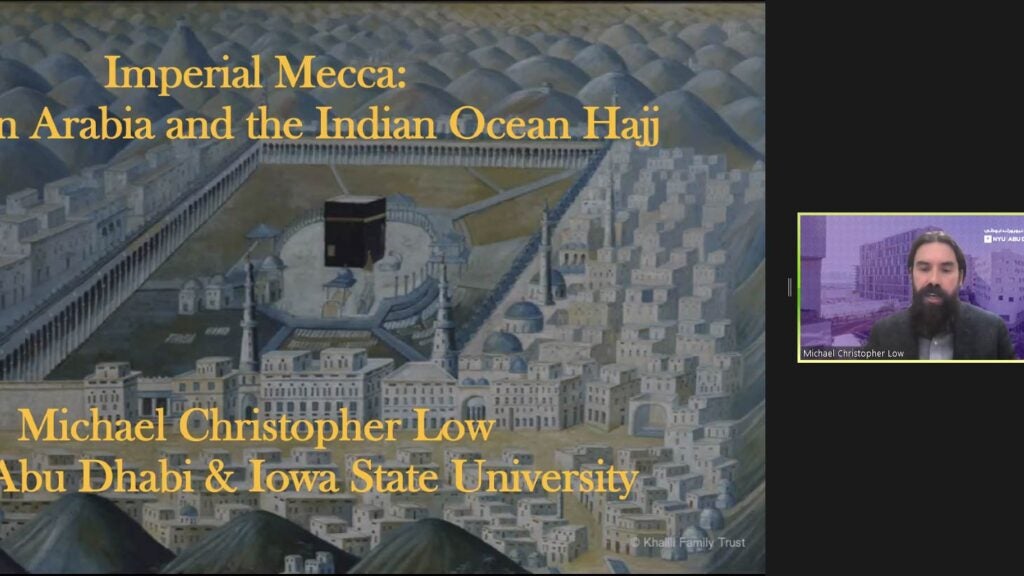At QF, Georgetown Brings Together Scholars for a Study of the History of Islam’s Holiest Cities

The Indian Ocean Working Group (IOWG) research initiative at QF-partner Georgetown University in Qatar (GU-Q) organized a Loiy Hammad Memorial Lecture on the history of the holy city of Mecca and the hajj pilgrimage in the era of British imperialism. Featuring Dr. Michael Christopher Low from Iowa State University, the webinar brought together scholars from across Doha and around the world to discuss Dr. Low’s recent book, Imperial Mecca: Ottoman Arabia and the Indian Ocean Hajj (2020) published by Columbia University Press.
In his book, Dr. Low draws on Ottoman and British archival sources as well as published materials in Arabic and Turkish to analyze how the Hijaz, a region of western Saudi Arabia comprising Islam’s holiest cities, Mecca and Medina, served as the nexus in the competing imperial interests of the Ottoman Empire and Britain’s steamship empire in the Indian Ocean and Red Sea. British Indian steamships, he explained, not only carried pilgrims into and across Ottoman-controlled lands, but also the threat of cholera, anti-colonial revolt, and direct confrontation with Ottoman sovereignty.
The Ottomans, explained Dr. Low, harbored great anxieties that the British planned “to bring the Hijaz, Najd, and Iraq under British protection and eventually turn them into colonies.” These fears were being increasingly fed by often ambiguously sourced press stories and diplomatic communiques, and suggested “a deeper cluster of anxieties about the Ottoman state’s inability to fully control the Hijaz’s heterogeneous, mobile populations, whether Bedouin or transient foreign pilgrims, and strengthen its territorial sovereignty over this traditionally autonomous province.”
While the fears of a colonial takeover of Islam’s holy cities never materialized, the British did manage to have significant influence on various Ottoman projects to modernize their vast empire and on matters of global public health and international law in the Arabian Peninsula. The establishment of medical facilities and accommodation for pilgrims at Mecca by the British, Dutch and other European colonial powers may be seen as a direct outgrowth of what Low calls the “colonization of the hajj.”
Assistant Professor of Government and IOWG founding member Dr. Uday Chandra, said: “This book is an important contribution to the literature on the Indian Ocean region, and in particular, on our understanding of the geopolitics of Islam’s holiest cities. Grounded in empirical research, Dr. Low’s book and articles inspired lively discussion and scholarly engagement, and provided a valuable contribution to our research focus on the Gulf, and the Indian Ocean world.”
Since 2014, the Indian Ocean Working Group (IOWG) at GU-Q has brought together scholars from across the world to build collaborative multidisciplinary networks that study the rich and complex histories of the places and peoples of the Indian Ocean rim. The IOWG’s Loiy Hammad Memorial Lecture Series is part of the GU-Q Virtual Hub for Global Dialogue: Engaging Communities, Finding Solutions initiative. The Virtual Hub platform gathers the university’s broad efforts to bring the community together for engaging discussions on salient issues affecting our world today.